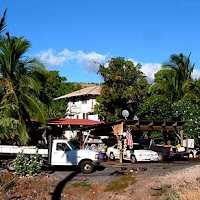Points of View

I was browsing through the webiverse yesterday and stumbled across some very lovely talk-story accounts of the history, culture, and spiritual importance of Kawaihae .
As I read it one thing stuck in my throat a bit-- the people interviewed sadly mention the vast influx of extremely wealthy mainland people into the community. They say the populations of local people are shrinking and vanishing as the haole come in, buy everything up, and then lock themselves in their million-dollar gated communities.
Here's one bit:
“Back in the old times, we had a really strong sense of community,” Pua remarks.
“Now it’s separated. Everybody has their own thing. Everybody wants this and
everybody wants that and nobody wants to come together, and make it work. ‘I
want this, I want a park,’ somebody else wants this and everybody want, want,
want, but nobody wants to do what it takes to make it happen. So, I say, that
during my time of growing up, we were as one community and one family. Not
today. Today, it’s divided."
“That’s because of the new people coming in. Because you get new people come in with new ideas. They will not accept your ideas, although you’ve been here a long time, and you know what works and what doesn’t. Because they have such strong minds and they want to do what they think is righ, we go head on, we lock horns. We try to make everything workable so that everybody is agreeable, but it doesn’t happen that way."
“As far as I’m concerned the only community I know is my auntie next door, me, my
cousin up the road and this one up here,” Ku‘ulei points out. “That’s my community to me, because that’s all that exists of what I knew as a community. Everybody else that’s here now, they’re new people—with new problems and new issues. We’ve been here for centuries, and we can’t even resolve our problems. We’re fighting just to stay here every day."
The Hawaiian people I know tend to share that view-- that the haole people are coming in, buying everything up, and wrecking it all.
 Of course, that's true. There are several sterile gated communities all along the Kohala coast-- I have friends employed cleaning those places--flushing the toilets and dusting all of their genuine Hawaiian art twice a week.
Of course, that's true. There are several sterile gated communities all along the Kohala coast-- I have friends employed cleaning those places--flushing the toilets and dusting all of their genuine Hawaiian art twice a week.But to me it doesn't seem like the malevolent tsunami of influx the way it was described on this site-- that the haole are coming in to wreck it all on purpose. It's seems more like a steady dribble coming in rather than a vast wave.
Like the woman at the community planning meeting said, I think most malihini recognize the tender issues of place and belonging and displacement and think, "I don't want to be a part of the problem."
But is it hopeless? Just by being here and being haole (by which I'm of course including all other mainlanders, regardless of race) are you the problem?
Mainlanders earnestly shopping at the farmers markets, fighting for the Puu preservation plans and for better schools, taking hula classes, and competing with each other ("oh you've been here 2 years? I've been here 6 years!")-- certainly don't see themselves as wrecking it all. Rather they (we) see themselves as wanting to be a part of all of the wonderful stuff that Hawaii has to offer.
I'm glad that I've got this weird, sometimes dysfunctional, church family. It is a wonderful equalizer-- I have friends I love whose families have been here for 1 year, 20 years, 50 years, and thousands of years. Within that community we hopefully see each other less as "haole invaders" or "resentful natives" but as bossy Sister So-and-so or gentle Brother-Such-and-such. Not that it's perfect-- I have been referred to as "the other haole" and the ecclestical leader still cannot pronounce anyone's names (including his own daughter's Hawaiian name) for all his 20 years in the islands, and one woman shoo-ed my half-Japanese husband away to tell me in conspiratorial tones, "it's SO good to see a little blond baby."
It's cliche but the only way to overcome the barriers of race and resentment is through face to face honest interaction-- work. If communities continue to isolate themselves in gated developments or family bubbles, of course we will never understand each other. There are bossy, gentle, selfish, helpful, wise, and insightful people in every side of the fence.
Comment from M
ReplyDeletewhat I want to know is: what has changed exactly?
not that things haven't
But what EXACTLY are the angry haoles doing?
I never seem to hear that part surface
What does Pua "lock horns" over?
and with who?
whom?
Not all change is bad
Look at Pomai active in the planning stuff
Maybe the planning thing is a new mainland thing, but she's right there
Then again, maybe that's to be expected
Afterall, she does sail thousands of miles on a traditional canoe equipped with satellite phones
plastic water jugs
coolers
neoprene
gortex
etc.
new and traditional
Hopefully more and more are realizing you can be traditional and not "eating bugs and sleeping on the floor"*
"Micronesians is not my heritage"
Maybe to a different degree...
Locals (Japanese, Hawaiians, Filipinos, etc.)
suffer from the mystical fairy tale yesterday that only exists in the minds of other Republicans*
But I think a LOT actually HAS been lost
You can't go from a pop of 40,000 on Maui in 1960
to a pop of 140K in 2008
and not have left something behind.
*Simpsons Quotes